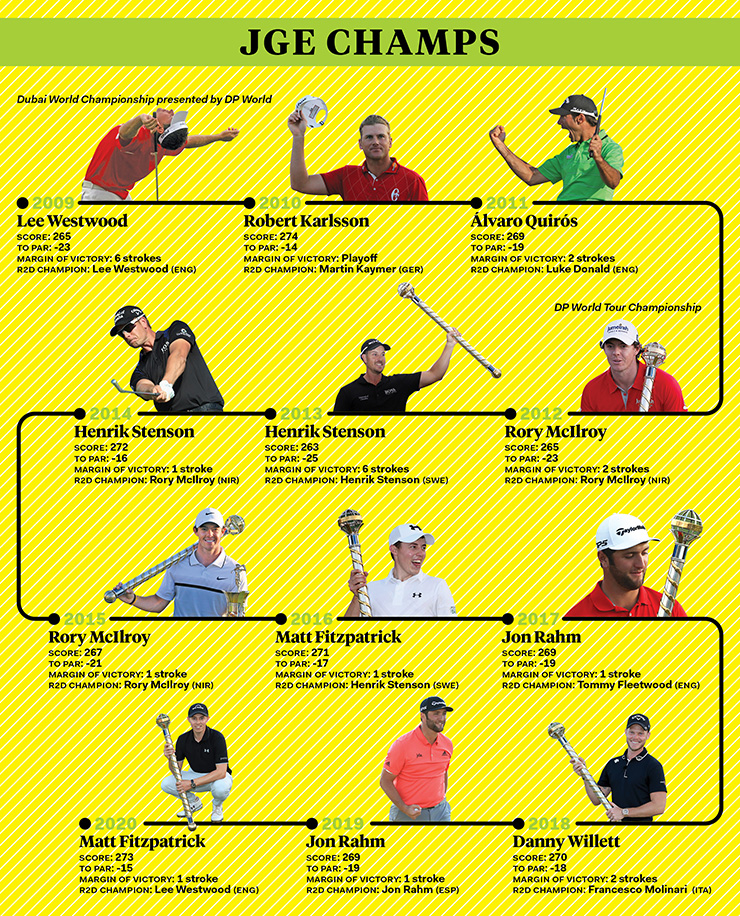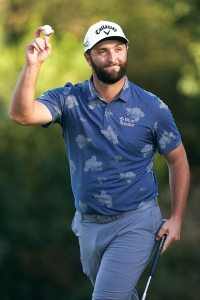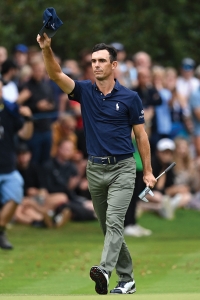Jumeirah Golf Estates is set to host the European Tour’s season finale for a 13th time this month. What happens after the two-event Dubai decider is even more intriguing
By Kent Gray
After a year of unexpected twists and unavoidable turns, the 2021 Race to Dubai has finally reached its home straight. Just two tournaments remain following 38 events in 19 countries – a schedule complete with numerous cancellations and just about as many hastily-arranged replacements. To understand what happens next – over the remaining 11 day, 144 hole sprint at Jumeirah Golf Estates and, even more crucially over the next season or three – an abacus in the first instance and a crystal ball thereafter are required.
Let’s dust off the virtual old-school calculator first. As the cliché has reminded us since 2009, the European Tour’s season-long marathon again ends here but, like last year, there’s a COVID-19 asterisk attached to the JGE finale.
Courtesy of yet another 11th-hour scheduling reshuffle that is South Africa’s loss and the UAE’s gain, we’re again being treated to a forerunner on Fire to the DP World Tour Championship (DPWTC), the traditional, season-deciding four-day circumnavigation of Earth.
The apparently stop-gap Golf in Dubai Championship of 2020 has become the evidently stop-gap AVIV Dubai Championship of 2021 and for that, and continually plugging pandemic-enforced gaps in their calendar, the European Tour deserve genuine kudos.


For the second successive year, Greg Norman’s Fire layout at JGE will play host to the penultimate event of the Race to Dubai season.
Still, a mildly irritating and historic truism about the $9 million DPWTC persists – exactly which of the season’s drawcard players will show up for the richest and supposedly most important event outside of the majors and WGCs. If the superstars do play, that they leave it so late to publicly confirm their appearance at JGE hardly encourages the pre-tournament PR upsurge envisaged when the Race to Dubai was imagined into life.
Traces of blame can be found clinging to pandemic-enforced travel challenges that have become a reoccurring headache for administrators and a chore for players at the end of a very long year, stretched in 2021 by the Olympics and Ryder Cup.
But the truth is more deep-rooted and now, in tandem with the challenging times in which we live, highlight a sobering series of question marks hanging over the future direction of the Old World circuit.
Money and the interconnected Race to Dubai points system, one contrived for the majors and WGC events that the superstars play and convoluted by the smaller purse events they don’t, is the obvious elephant in the room.

Outside of the majors and WGCs, Open champion and R2D leader Collin Morikawa played two regular season events: Dubai and Scotland for T-68 and T-71 finishes.
In this part of the world, it’s comfortable to simply get on with supporting and reporting the Race to Dubai, pontificating on the promised ‘last Sunday in the season’ excitement and enjoying the excellent social content that will inevitably be produced by the circuit’s media gurus.
Trained optimists – an army of marketers and PR peddlers among them – will trumpet another season going down to the wire. All’s well that ends well and all that. They’ll also point to the open courtship with the PGA Tour as a further reason not to fret the future, especially with the anticipation that this pesky plague can’t go on forever.
Others with an equal stake in the European Tour’s ability to thrive in an increasingly tough sports and business landscape are less optimistic. The natural pessimists are the owners of many of the unanswered questions too.
Like whether the powerbrokers at Wentworth lose sleep over the fact that their season-decider doesn’t guarantee the appearance of the tour’s biggest names, much less entice the game’s biggest headliners to be involved all year long? Unfair? Take the word of R2D title contender Billy Horschel: “I’ll be honest, at the beginning of the year, the Race to Dubai wasn’t one of my goals.”
How about the growing number of $1.5 million or lower events spread throughout recent seasons. Is this a pandemic amplified blip or a pointer to a longer-term issue? Rolex Series events such as the Abu Dhabi Championship and now the Dubai Desert Classic notwithstanding, how can the European Tour compete with the riches, media focus and resulting fan engagement of the PGA Tour? And perhaps, if the whispers prove correct, the new-look Asia Tour and/or its offshoots in coming seasons?
That’s perhaps the most fascinating poser of all; what exactly do the European Tour make of the tug of war underway on the game’s traditional global boundaries, a scrap that has already seen the loss of the geographically and fiscally important Saudi, Malaysian and Hong Kong Opens to the Asian Tour? Isn’t the power-shift, with neon signs (and truckloads of Saudi Riyal) pointed towards South East Asia, troubling?
The caveat to all this, of course, is that COVID-19 continues to change everything on a cough here and a sneeze there. The much-heralded strategic alliance with the PGA Tour is also in its embryonic stages so perhaps a brighter path beyond 2022 will emerge, full of co-sanctioned events and a European Tour that essentially serves as a feeder to an upgraded PGA Tour incorporating tournaments like Dubai/Wentworth/Scotland/Ireland etc? Perhaps Keith Pelley and co have another master, Euro (and Middle East)-centric plan and will hold a ‘State of the Nation’ presser at JGE like the good old days to update the media, and by extension, the fans? It sure would be nice to have a clearer picture of the long-term strategy.

It ends here
Back to the now teenage and troublesome Race to Dubai format. Concocting a playoff series that leads to a meaningful climax at the end of a season with so many moving parts was never going to be easy.
Nor was it ever going to be a first concept, all problems solved forever solution. The fact players who rarely grace “regular season” events can win the overall title must grate with the relative journeyman who battle to pay the mortgage and compile enough points to crack the next level as a consequence. Sure, players that repeatedly perform at the elite events need to be proportionally rewarded but it is also a self-perpetuating scenario of the rich getting richer. In Europe, the fear is that it becomes a black hole for some very tidy players as the best increasingly chase the big money in the US, and perhaps soon Asia. That fans want to see the best competing together week-in and week-out is indisputable and that only threatens to hasten the vacuum of top-notch players and sponsorship opportunities. All the spin and cracking social media in the world can’t camouflage your event’s strength of field rating and the conspicuous lack of headliners.

Of the top three in the R2D standings, third-placed reigning U.S. Open champion Jon Rahm has played the most regular season events; the Scottish Open (7th), Open de España (T-17) and Andalucia Masters (MC).
In the European Tour’s defence, the FedEx Cup playoff series, where the leaders start the deciding PGA Tour Championship with a descending stroke advantage over their rivals, is not perfect. But at least you now know the winner of their Tour Championship is the champion of the entire season.
European fans get nuance – the fact that the DPWTC winner isn’t necessarily the Race to Dubai champion. Still, how many times have we seen the cameras zoom in on finishers in the scorers’ hut at JGE munching on fingernails, hoping the final few decimal points fall their way as the late finishers negotiate Earth’s closing holes. If they can’t easily crunch the numbers when it is their day job, what chance the fans? It’s either unpredictable, thrilling theatre or just plain confusing. Perhaps both.
It seems the current Race to Dubai format, if not entirely broken, needs seriously tinkering, an overhaul only triggered by a massive cash injection. Or are we stuck with the status quo until the PGA Tour partnership truly takes hold? Fans await the blueprint with baited breath.
In the meantime, what will the 13th edition of the DPWTC guarantee? For starters, recent history suggests that the eventual winner of the AVIV Championship is unlikely to be one of the serious contenders for the Race to Dubai title as the point leaders remain on ice until the final 72 holes of the season.
Presuming (and hoping) most of the Race to Dubai top-10 touch down at DXB, the key plot will be whether defending Open champion Collin Morikawa or second-placed Billy Horschel can become the first American winner of the Harry Vardon Trophy, doing what Patrick Reed has narrowly been unable to achieve in recent seasons. Or will Jon Rahm embellish his standing as world No.1 by becoming European No.1 for a third time in five years?
Perhaps reigning Abu Dhabi champion Tyrrell Hatton can finish the calendar year like he started it – with victory in the UAE – and snare enough of the 12,000 R2D points on offer at the DPWTC to pip the Americans and Rahm at the tape? Will Hatton and Matthew Fitzpatrick, fourth and fifth in the standings respectively as we went to press, tee it up in the AVIV Dubai Championship in the hope of making the DPWTC finale more than a three-horse race?

Billy Horschel is second in the R2D standings courtesy of winning the flagship BMW PGA Championship and the WGC Match-Play. He also teed it up in the Scottish and Alfred Dunhill Links Championship this season.
Will Victor Hovland, Tommy Fleetwood, Robert MacIntyre and Rory McIlroy (who confirmed he was Dubai-bound, not via official channels, but at the recent U.S. F1 Grand Prix of all places) play one or both events despite having no chance of finishing top of the season standings? So many potentially interesting permutations, so many unknowns.
All is well that ends well but how much better could the season finale be with more certainty. Sadly this isn’t a perfect world because of another C word, the one that still has us social distancing. But the pandemic isn’t the only curve ball in the European Tour’s court as we draw the curtain on 2021.
What happens next is not only fascinating but potentially (and literally) game-changing too, for the European Tour and the global game.
The immediate race may end at JGE but the decision-makers at Wentworth are on a never ending treadmill, one seemingly getting faster and faster by minute. The hope is that everyone else associated with the circuit, all those with livelihoods that swing on missed or made 10-footers even if they aren’t actually holding the putter, can cling on until the new norm is finally established.









